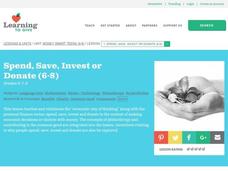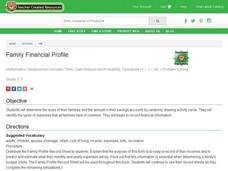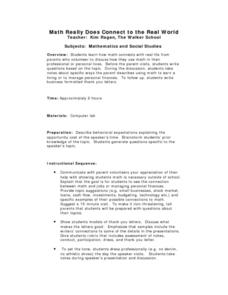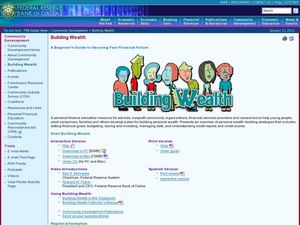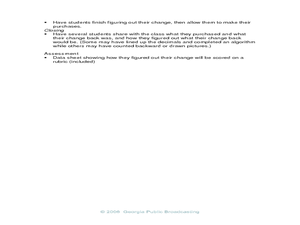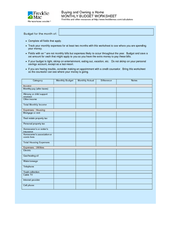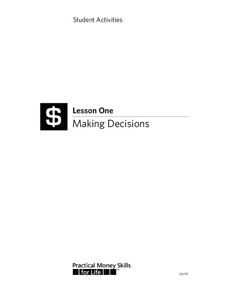Curated OER
Spend, Save, Invest or Donate
Learners explore the concept of philanthropy. In this personal finance lesson, students consider economic choices and why people donate to causes. Learners investigate the processes of borrowing money and investing money in the lesson as...
Curated OER
Family Financial Profile
Students investigate the cost of living. In this financial awareness lesson plan, students play a game to simulate various family situations and their incomes. Students choose activity cards and record information on their family profile...
Curated OER
Math Really Does Connect to the Real World
Students listen to parent speakers who discuss how they use math in their professional or personal lives. They take notes and write business form thank you letters.
Curated OER
"Reality Math: Fact or Fiction"
Students investigate the use of math in everyday life. They investigate several occupations and pay scales. They complete spreadsheets that show how monthly bills can be organized using technology. They use word processing software to...
Curated OER
Kermit the Hermit
Students consider money management. In this personal finances instructional activity, students read Kermit the Hermit and discuss what was done with the unexpected money that Kermit received. Students examine methods of saving money and...
Curated OER
Shopping!!!
Students explore money management. In this financial awareness instructional activity, students are given an amount of money and a sheet of objects to choose from to buy. Students choose only five objects they can afford to "buy."
Curated OER
Checks and Balances
Students discuss elements of financial planning. In this personal finance lesson, students practice filling out personal banking information. Students conduct research using the Internet and a PowerPoint presentation to find out how to...
EngageNY
The Mathematics Behind a Structured Savings Plan
Make your money work for you. Future economists learn how to apply sigma notation and how to calculate the sum of a finite geometric series. The skill is essential in determining the future value of a structured savings plan with...
Visa
Allowances and Spending Plans
Help youngsters understand how to manage small amounts of money by discussing an allowance and the difference between spending, saving, and giving.
Visa
Cars and Loans
What's the best way to pay for a car? Should I buy used or new? Can I realistically afford a car? Pupils discover the ins and outs of buying a car, from how to shop for car insurance to the advantages and disadvantages of leasing.
Alabama Learning Exchange
Comparing Fuel Economy
Compute fuel economy and gas mileage. Why? So you can teach rates and ratios, of course! Middle schoolers calculate the rate of miles per gallon for various vehicles. They research each vehicle, its mileage per gallon, and cost per...
Visa
Making Spending Decisions
By role playing real-world experiences, such as purchasing snacks and grocery/toy store shopping, your youngsters will begin to develop an understanding of how to make decisions and choose between alternatives. This is the first lesson...
Curated OER
Building Wealth
Students explore budgeting. in this building wealth lesson, students examine ways to invest and save money. They set financial goals and determine methods to reach the goals. Students discuss managing debt, credit reports and credit...
Visa
Make It Happen: Saving for a Rainy Day
Every little penny counts, especially when it comes to saving for emergencies or long-term goals. Pupils evaluate different saving and investment strategies, such as a CD or money market account, through worksheets and by researching...
Federal Reserve Bank
Creditors’ Criteria and Borrowers’ Rights and Responsibilities
Discover what criteria creditors use for making loans (the 3 Cs of Credit), and impress upon your young adults the rights and responsibilities related to using credit. Pupils role play as individuals seeking or providing credit, as well...
Federal Reserve Bank
Invest in Yourself
What are the different ways that people can invest in their human capital for a better future? Pupils participate in an engaging hands-on activity and analyze data regarding unemployment, the ability to obtain an education, and median...
Curated OER
Money Worksheet
In this personal finance instructional activity, students use their problem solving skills to calculate exchange rates and practice writing checks.
Curated OER
SPENDING: Maintaining the Skill of Money
Fourth graders explore the concept of maintaining money. In this personal finance lesson, 4th graders earn "money" for cleaning their classroom desks. Students spend the "money" in the classroom and practice making change.
Curated OER
Interest Rate Assignment
In this personal finance worksheet, students use their problem solving skills to calculate interest rates for loans of different lengths of time.
Curated OER
Buying and Owning a Home: Monthly Budget Worksheet
In this personal finance instructional activity, students complete the graphic organizer as they chart the 40 listed monthly expenses for 2 months.
Curated OER
The Business of Credit
Learn about credit ratings and how it plays a role in the function of small businesses. Learners use their knowledge of good and bad credit to role play and determine good credit vs. bad credit in the area of small businesses.
Curated OER
Budgeting for the Future
Eighth graders determine the net amount of an income for a fictional job. They must determine their net worth minus standard deductions. Students must then determine their monthly budget including, groceries, credit, and rent.
Curated OER
Visiting the Arcade
Second graders take a trip to the arcade in an activity that engages them in problem solving with money. Composed of three word problems, youngsters are instructed to determine various combinations to represent a given value by using...
Visa
Making Decisions
What economic factors can influence personal and financial decisions? In an effort to understand opportunity costs and the time value of money, pupils engage in role-playing activities and discussion, as well as view a PowerPoint...


